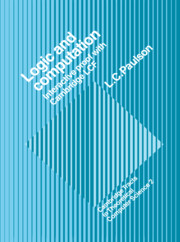7 - Axioms and Inference Rules
Published online by Cambridge University Press: 17 September 2009
Summary
When representing a logic on a computer, how should we treat inference rules? A rule, given appropriate premises, delivers a conclusion, so LCF represents an inference rule by a function from theorems to theorems. Theorems of PPλ are represented by the ML data type thm. Axioms and rules of PPλ are predefined identifiers. Each axiom is a theorem; applying rules to axioms computes new theorems.
This chapter lists the axioms, inference rules, and predefined theorems of PPλ. The examples include formal proofs from previous chapters, performed in LCF.
The representation of inference rules
A rule may hold only if its premises have a certain form; otherwise the corresponding ML function fails, raising exception rule of type string × thm list. The exception includes an error message and the offending premises.
In certain inference rules, the premises do not contain enough information to completely determine the conclusion. The corresponding function takes additional arguments, giving parts of the conclusion or even a formula stating the conclusion itself.
To implement quantifier rules, the abstract syntax functions of Chapter 5 perform substitution and enforce the provisos on eigenvariables. If a proviso is violated, the rule fails.
In the sequent Γ ├ A, the assumptions Γ are usually regarded as a set. ML represents a set of PPλ formulae as a list without repetitions. The LCF user need not be concerned with the order of the assumptions in the assumption list.
- Type
- Chapter
- Information
- Logic and ComputationInteractive Proof with Cambridge LCF, pp. 181 - 208Publisher: Cambridge University PressPrint publication year: 1987



